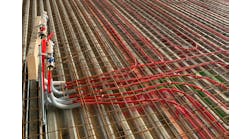WASHINGTON — Industry opposition is building to the Home Star legislation, more commonly known as “Cash for Caulkers.” The U.S. House of Representatives has passed its version of the Home Star Energy Retrofit Act of 2010. The Senate version, S.3434, is still in committee. Either version will be troublesome for contractors.
Neither contains any provision for water conservation. A source with the International Code Council told CONTRACTOR that ICC lobbied to get water conservation included in the legislation but was rebuffed.
The House version has rebates for energy-saving measures paid to the homeowner, but the Senate version would force contractors to finance the work and then wait for the rebates. Both versions require contractors working at the highest “gold” level of performance-based retrofits to be certified by the Building Performance Institute, Malta, N.Y., even though 86% of the contractors who are certified by BPI are only in New York and New Jersey.
"We are certainly supportive of the goals of this legislation, to make American homes more energy efficient, and provide much-needed jobs in the construction industry," said John Sedine, Air Conditioning Contractors of America chairman and president of Engineered Heating & Cooling in Michigan, as the association publicly released the text of a letter sent to the chairmen and ranking members of the Senate Finance Committee and Energy & Natural Resources Committee. "Unfortunately, certain provisions in this legislation make the achievement of these goals actually less likely."
Specifically, the association is concerned about the structure of the rebate program in the Senate bill, which would require contractors to discount bills upfront and wait to receive payment from a rebate aggregator.
“Requiring contractors to become bankers means that many small businesses — the small business that are the driving force of our fragile economic growth! — will not be able to participate in this program at all, even though they may be very well qualified to do so, simply because they can't afford to take the financial risk,” Sedine says.
In the House version of Home Star, a last-minute amendment attempted to address ACCA's concern on this issue, requiring rebates be sent to the homeowners after sale. However, the Senate legislation, as written, would still require contractors to float loans on their customers' behalf.
“First off, it will kill the small contractors,” said Tom Meyer, P.E., a registered lobbyist for The ESCO Institute. “They are not a bank. Their cash flow tenuous at best, especially in these times and to add 30-plus days to cash flow is brutal. If you talk to the supply houses, they’ll tell you that’s the reality of it. The Senate Energy Subcommittee assures me it will take less than 30 days until contractors get payment, but there’s low credibility on that.”
ACCA is also concerned that one section of the legislation, known as "Gold Star," will turn what should be a "quick-hit" bill promoting jobs and energy efficiency for the entire country, into a jobs bill for just a few states. This part of the legislation offers larger rebates for work that enhances a home's entire energy performance, but requires that work be done by businesses accredited by the Building Performance Institute.
Home Star establishes two types of consumer incentives. The Silver Star program would provide up-front rebates of up to $3,000 for specific energy-saving investments, including insulation, duct sealing, windows and doors, air sealing and water heaters. The Gold Star program provides homeowners with up to $8,000 for conducting a comprehensive energy audit and substantially reducing their energy use at home.
For the Silver Star program, homeowners receive between $1,000 and $1,500 for each measure installed in the home, or $250 per appliance, with a benefit not exceeding $3,000 or at least 50% of total project costs, whichever is less.
Eligible appliances include:
- Heating system: A natural gas or propane furnace with an AFUE rating of 92 or greater. A natural gas or propane boiler that has an AFUE rating of 90 or greater. An oil furnace with an AFUE rating of 86 or greater. An oil boiler with an AFUE rating of 86 or greater.
- Air conditioner replacement: Unit with a SEER 16 and EER 13 or higher.
- Heat Pump Replacement: Unit with a SEER 15, EER 12.5 and HSPF 8.5.
- Energy Star-qualified geothermal heat pump: Meets Tier 2 efficiency requirements.
- Natural gas or propane water heater: Has an energy factor of .80 or more or a thermal efficiency of 90% of more.
- Tankless natural gas or propane water heater: Energy factor of at least .82.
- Natural gas or propane storage water heater: Energy factor of at least .67.
- Electric storage water heater: Energy factor of 2.0 or more.
- Electric tankless water heater: Efficiency factor of .96 or more that operates on not greater than 25 kilowatts.
For Gold Star, the performance path that requires energy modeling, consumers receive $3,000 for modeled savings of 20%, plus an additional $1,000 incentive for each additional 5% of modeled energy savings, with incentives not to exceed 50% of project costs.
In ACCA's letter to Sens. Jeff Bingaman, Max Baucus, Lisa Murkowski and Charles Grassley, ACCA President and CEO Paul Stalknecht wrote, “ACCA is concerned that the accreditation requirement will limit the choice for homeowners who may want to take advantage of the Gold Star rebates that are determined by whole home energy improvements. Currently, 29 states do not have a single contractor who could offer homeowners a pathway to Gold Star rebates. At the same time, New York and New Jersey, where more than 86% of all BPI accredited contractors are located, could absorb the bulk of rebate funds in the first year alone."
A reporter from suburban Chicago who searched on BPI’s website for a BPI-accredited contractor found the closest one was located in Kalamazoo, Mich., 129 miles away.
“Contractors for the Gold Star side have to be BPI accredited and workers have to be BPI certified,” Meyer said. “That sounds OK until you go to the BPI website and pull down the qualifications and it becomes very strange.”
For example, Meyer noted that contractors would have to meet BPI standards that may not exist. On June 22, BPI issued a call for volunteers to sit on four working groups to develop standards to support the Home Star program. Meyer, who has sat on numerous committees, noted that the standards development process is measured in years.
The requirement for BPI accreditation also negates any other accreditation or certification for energy analysis and modeling, such as that from the Association of Energy Engineers.

